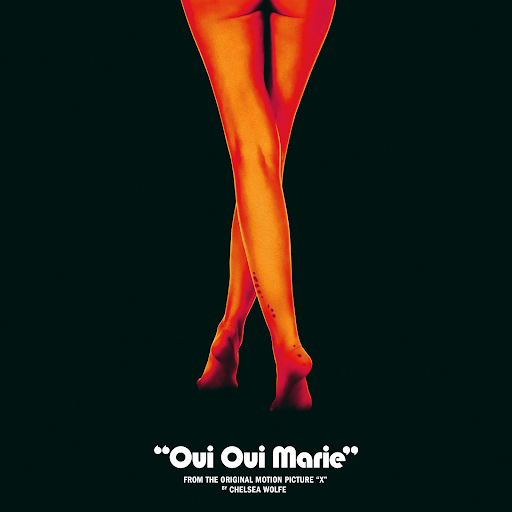Cover Story: Chelsea Wolfe’s Version of “Oui Oui Marie” Tells a Deadly Tale of Infatuation That’s Mirrored in “X”
As the main track featured in the 2022 horror film “X,” Chelsea Wolfe’s cover of “Oui Oui Marie” tells a sinister story of obsession in the face of a dying romance.
Written by C.S. Harper
Image courtesy of Andre De Takacs and photo courtesy of Parker Day
Despite being hailed as a classic love tune, much about the 1918 song “Oui Oui Marie” remains a mystery. According to its Library of Congress biography, it was composed by German-born American composer Fred Fisher and written by lyricists Alfred Bryan and Joe McCarthy. Though several vaudeville performers covered the track, the best-known recording — and the only one available on Spotify besides Chelsea Wolfe’s — belongs to American baritone Arthur Fields. Little else is known about the track, and that’s exactly what makes it so haunting.
Although the original song focused on an American World War I veteran who attempts to communicate with his French love interest despite their language barrier, Chelsea Wolfe twists it into something much more sinister. As the centerpiece of the 2022 slasher film “X,” Wolfe’s cover takes an ode to puppy love and transforms it into a dark tale of obsession that parallels the relationships portrayed onscreen.
Set in 1979, “X” follows a group of pornographers who stay at an elderly couple’s rural Texas property to shoot an adult film. But the hostess, Pearl, who has not been intimate with her husband Howard for a long time, has other motives. After her sexual advances were shot down by the film’s star, Maxine, and its writer-director, R.J., Pearl goes on a murderous rampage, killing the pornographers one by one with Howard’s help. “Oui Oui Marie” plays near the end of the film, when Maxine kills Pearl in revenge for taking her friends’ lives. The song drones on as Maxine drives away from the property and says, “Divine intervention. Praise the fuckin’ Lord,” referencing the hypocritical self-righteousness of people like Pearl, who had the audacity to slut-shame Maxine despite being a “kidnappin’, murderin’ sex fiend.”
At first, “Oui Oui Marie” seems like an odd choice to accompany the turning point of the film. With heartfelt lyrics like “I love your eyes, they make me feel so swoony,” the track seems to juxtapose the morbid subject matter of “X.” But with Wolfe’s adjustments, the song becomes much darker. Its narrative reflects the withering romance between Howard and Pearl, which drives the latter to the twisted acts of devotion that drive the movie.
Lyrically, Wolfe’s cover stays true to the original, but its production deviates to create a substantially different tone. Fields’ version features a cheery vaudeville band, complete with flutes and drums, to mirror the veteran’s happy-go-lucky tone. Wolfe’s cover, however, is less sonically dense, lacking percussion altogether. Accompanied simply by layered reverb and the ebb and flow of guitar strums, the California songstress creates an ominous tone that fits perfectly within the universe of “X.”
Image courtesy of A24
But perhaps what is most starkly different between the two versions is the vocals. Fields’ voice is chipper and fast-paced, whereas Wolfe sings in a minor key. Her vocals sound pained, as she uses distortion in the verses to create a warbly, dissonant tone. She also explores a fuller breadth of her vocal range, going from a devastating quasi-falsetto to hair-raising, husky notes. To further this dramatic effect, the California singer also slows down the tempo significantly, pausing at the end of certain lines.
Even though the lyrics remain unchanged, these gloomy sonics end up changing their meaning substantially within the context of the film. “If you do this for me, oui, oui, Marie / Then I’ll do that for you,” Wolfe sings in a prolonged, foreboding low note. Instead of denoting a simple romantic exchange, these lyrics now call back to Pearl and Howard’s reciprocal albeit loveless relationship, in which one kills to show passion for the other. Similarly, “You’ll drive me loony / You’re teasing me” becomes a reference to the couple’s cat-and-mouse game of murdering guests until they finally seduce each other into having sex.
Before the last refrain, Wolfe uses another pause for effect: “You’re teasing me,” she cries before a brief silence ensues, and she goes on, “Why can’t we parlez-vous like other sweethearts do?” Rather than the language barrier that Fields laments in his original version, this “parlez-vous” in the final refrain refers to the lack of intimacy between the elderly couple; the painful, vast abyss that is growing in their dying relationship.
With a mysterious backstory and grisly film to go along with it, “Oui Oui Marie” is the perfect addition to gothic singer Chelsea Wolfe’s catalog. Although this cover dramatically transforms the original’s meaning simply via sonic changes, these stylistic choices are for the better. With her brooding vocals and minimalistic instrumental, Wolfe reimagines a classic World War I love song into a memorable horror anthem that’s bound to get “X” under viewers’ skins.


